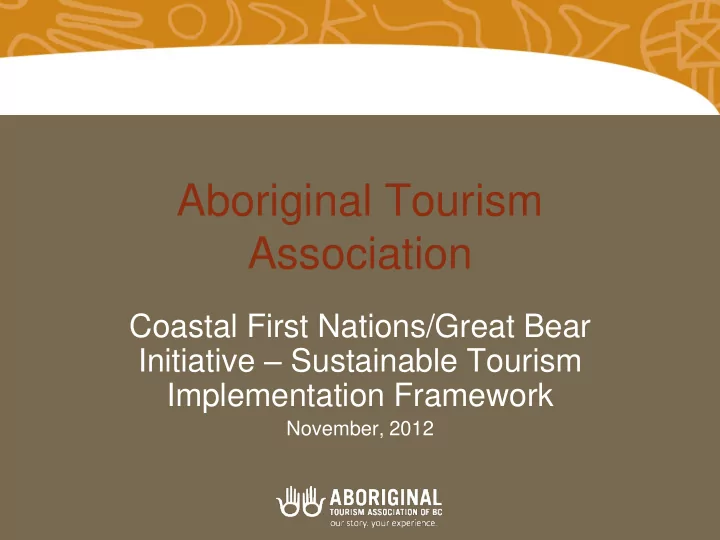

Aboriginal Tourism Association Coastal First Nations/Great Bear Initiative – Sustainable Tourism Implementation Framework November, 2012
Background • Coastal First Nations/Great Bear Initiative goals and objectives include the development and implementation of business plans for sustainable tourism • Land use planning processes have been completed • Marine use planning is in progress
Reconciliation Protocol Agreement • These planning processes gave rise to The Reconciliation Protocol Agreement (RPA) • The RPA specifically envisions a “substantial increase in Nations and First Nations’ economic participation in conservancies and the tourism sector.”
Reconciliation Protocol Agreement Goals of the RPA: • Nations and First Nations secure and develop an equitable portion of the permit and tenure opportunities in their traditional territory and,
Reconciliation Protocol Agreement • Opportunities will be provided based on demonstrated Nations and First Nations interests and stated intentions of permit and tenure opportunities in their traditional territories and,
Reconciliation Protocol Agreement • Development is sustainable, based on sound business planning and consistent with applicable provincial and federal legislation • The tenure selection process is now underway
AtBC Relationship • Early in 2012, CFN/GBI signed a Statement of Cooperation with AtBC declaring their intention to work collaboratively for the betterment of GBI participating communities in the Central, North Coast and Haida Gwaii through the development of an Aboriginal cultural tourism industry that respects the unique qualities and richness of these coastal communities
Sustainable Tourism Implementation Framework • Each community and the region as a whole has the opportunity to secure the benefits of the tenures allocated under the RPA • CFN/GBI identified the need for a ‘sustainable tourism implementation framework’ • Goes far beyond a strategic plan – focus is on implementation and results
Implementation Framework 1. Define the collective tourism market opportunity for Coastal First Nations – identify highest opportunity target markets, their purchase motivators, and describe the types of experiences they are seeking
Implementation Framework 2. Conduct community visits/product reconnaissance to identify Aboriginal tourism experiences in each community that are appropriately shared and are of interest to visitors – must be authentic; interactive; by featuring that which is local – the people, the culture, the land - experiences are created that cannot be imitated – competitive advantage is inherent
Implementation Framework 3. Undertake a comprehensive survey of readiness to participate in the global tourism economy and existing local capacity through dialogue with leadership and members. Utilize AtBC three tiered approach to define the strategies required for each community to participate in a sustainable tourism economy
Implementation Framework 4. Conduct a two-day tourism forum with all member communities to share information on lessons learned, identify opportunities to work together, document next steps in tourism development for each community individually and the group as a whole
Implementation Framework 5. Provide input and recommendations for tenure selection under the RPA and CFN/GBI marine use planning process
Implementation Framework 6. Identify activities that are best approached collectively by all Coastal First Nations with market-ready product offerings e.g. branding, awareness building, marketing, media relations, tour operator relationships etc. as well as programs to build local capacity to participate in the tourism economy
Implementation Framework 7. Develop a multi year program to develop local capacity to deliver market ready tourism experiences including formation of strategic alliances with educational institutions, partnerships with existing business operators and provision of ongoing mentoring, business advice and support for new businesses as they launch and operate
Implementation Framework 8. Develop a Coastal First Nations tourism brand i.e. identify key messages to target markets that will influence travel choices and design an umbrella identity for use in all marketing and promotions that captures the collective essence of a Coastal First Nations experience for the visitor
Implementation Framework 9. Create regional marketing tools such as a consumer website, media kit, storylines and high resolution photo library for use by editors and journalists wishing to cover travel experiences with Coastal First Nations
Implementation Framework 10.Introduce export ready product to overseas and inbound tour operators through meetings, presentations, agent training and familiarization trips
Implementation Framework 11.Develop strategies for each community that are tailored to their individual stage of development
Implementation Framework 12.For each community already engaged in tourism or confirmed as ‘ready to proceed’ - identify new product development opportunities
Implementation Framework 13.Identify infrastructure challenges that are preventing business development (e.g. public washrooms, etc.) and develop strategies (including potential funding sources) to address lack of infrastructure that is preventing growth of tourism businesses
Implementation Framework 14.Facilitate the development of a business plan for each identified tourism business opportunity
Implementation Framework 15.Ongoing community consultation on implementation progress, new opportunities, challenges
Implementation Framework 16.Regular re-visits to communities and newly launched businesses as well as offer ‘anytime’ telephone support to business operators
Phase I • November 13-15 th CFN/GBI Community Tourism Forum in Vancouver • Community representatives will meet to share ideas, opportunities and lessons learned • This forum will assist in defining next steps for communities and the region as a whole
Tourism Forum Outcomes • Current status of tourism development in CFN/GBI communities • Local and regional objectives for tourism development • Key target markets and the experiences they seek • Unique selling proposition for CFN/GBI communities individually and collectively
Tourism Forum Outcomes • Capacity building opportunities to be considered in a community and regional strategy • Product development opportunities to be considered in a community and regional strategy • Market development opportunities to be considered in a community and regional strategy
Tourism Forum Outcomes • Best practice model for the development of an aboriginal regional tourism strategy • Next steps in the development of a CFN/GBI regional tourism strategy
Recommend
More recommend